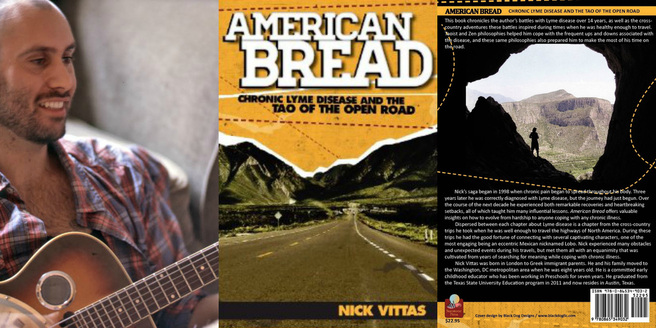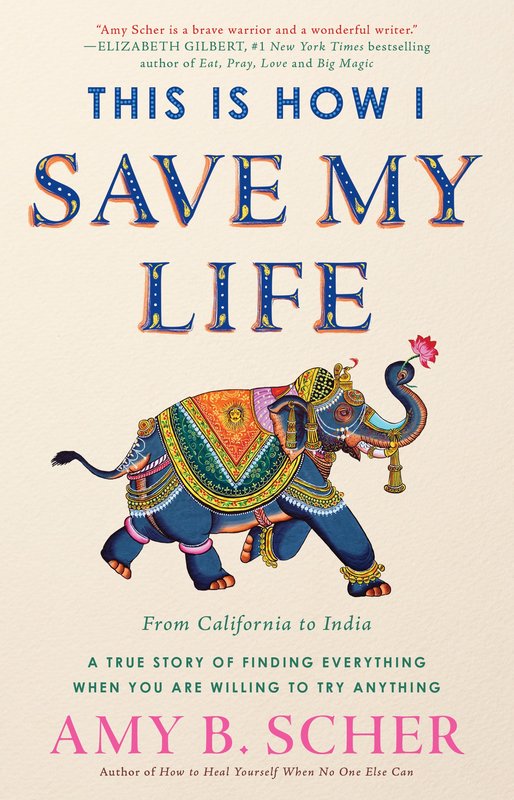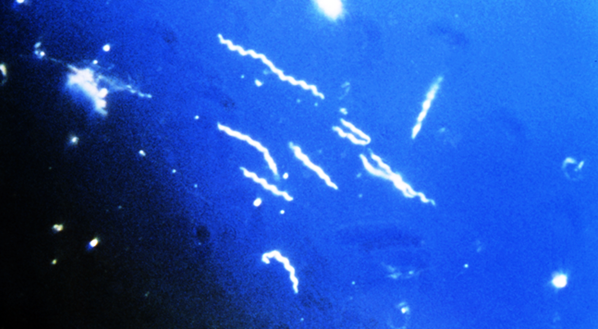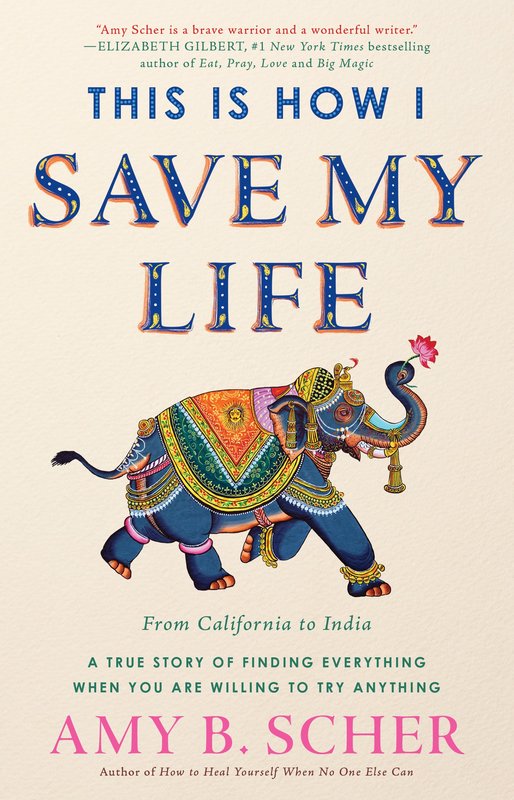Interview: Nick Vittas, Author Of "American Bread: Chronic Lyme Disease And The Tao Of The Open Road"
November 18, 2014 in Interviews by Shelley M. White, with Nick Vittas
Lyme disease is not your typical disease, and "American Bread: Chronic Lyme Disease and the Tao of the Open Road", is certainly not your typical book. Let's not waste time sugar coating it: the dark nights of Lyme disease are often downright unbearable. Somehow, though, we endure them. As we do, we often grope for something, anything, to make those seemingly unendurable moments more durable, to no avail. As an avid reader, my vice was to always reach for a book to both validate and soothe the darkness I felt. However, finding such a book proved challenging until I had the pleasure of opening "American Bread: Chronic Lyme Disease and the Tao of the Open Road" by Nick Vittas.
From page one, I felt as if I were reading the words imprinted deep in my soul, the ones I always believed no one could possibly understand. Fast-forward a few pages, and I suddenly found myself laughing out loud at the chapters detailing the tales of Vittas' travels, which are intertwined between the more serious chapters relaying the lessons his journey with Lyme disease has taught him. His words are enlightening and riddled with reminders of why we should remain hopeful and not give up, even when mere traces of hope are scarce.
"American Bread: Chronic Lyme Disease and the Tao of the Open Road" inspires readers to bear the often unbearable nights, and then wake up to bravely face yet another day. At the same time, it reminds readers that healing from Lyme disease does not always have to be a painful process faced with a heavy heart -in fact, it shouldn't be. It can simultaneously be a lighthearted adventure composed of laughter and the exposure of deep truths about oneself and the world around them. What is more healing than that?
Shelley: As you know, I am a huge fan of your work and am so thankful you decided to write "American Bread: Chronic Lyme Disease and the Tao of the Open Road". What made you want to write the book?
Nick: I wanted to write the book that I was searching for in the early years of my disease. I wanted to try to give someone newly diagnosed with late stage Lyme a head start by relaying the chronic pain and chronic illness coping methods I picked up over the course of my first 14 years of illness.
I also wanted to remind someone with chronic Lyme that there are many ups and downs with the disease—it’s a very fluid thing—so just because you are too sick to travel today does not mean that it will always stay that way. When I first became ill with late stage Lyme I did not realize the peaks and valleys associated with the disease, so I wanted to write a book that would leave the door open for adventure for those that are too ill to head out today.
Shelley: "American Bread: Chronic Lyme Disease and the Tao of the Open Road" shows one can still have fun and find joy in life, despite dealing with chronic pain. How have you managed to stay light hearted and find happiness amidst the pain?
Nick: I think the key is to adopt an outlook of enjoying what the disease allows you to enjoy instead of focusing on what the disease has taken away. Frustration is the biggest enemy to fulfillment, not the disease itself. In the early years of my illness I was very frustrated that all my athletic abilities had been stripped from me, so along with carrying the physical burden of chronic neck and back pain, I also carried a lot of emotional baggage. I spent a big part of my days cursing the disease and longing for my old body back. This kind of thinking completely moved me out of the present moment, robbing me of any chance to find fulfillment in the present. Nothing good ever came to me from wishing. Don’t wish!
There are many different ways to enjoy life. I found that my perception of happiness was very narrow in the early years of my disease. I could only be happy if I was pain free, athletically active, and able to do what I wanted exactly when I wanted. Slowly, as time passed, I became more flexible with what I would allow to bring me happiness. This flexibility has been my key to finding peace and happiness while coping with chronic pain.
Shelley: Many of the humorous, yet nonetheless enlightening, tales in your book are from the various road trips you have embarked on. A large majority of individuals with Lyme disease and other chronic illnesses find it difficult to even spend one night away from home. Any tips on how to travel with an illness like Lyme disease without jeopardizing your health?
Nick: I’ve had a lot of ups and downs with Lyme disease over the years. There were years when my symptoms were highly exasperated and years when the disease went into relative remission. Most of the travels in the book occurred during periods of decent health when my symptoms were on the milder side.
That being said, there were a few trips I took when my symptoms were exasperated, and the most important thing for me during those trips was to always put the disease first. I was already stressing my body by being away from home and driving long distances, so any reservation I had about any activity on the road—like a hike or a walk through a new city—I would weigh against the possible effect on my Lyme symptoms.
Again outlook helped a lot. If my back started to spasm in the middle of Nebraska, no matter how badly I wanted to get to Colorado, I would get a motel room and spend the next day or two lying down until the pain had returned to a moderate level. By avoiding frustration I would avoid pushing myself into a collapse.
Shelley: It seems you have been blessed with solid friendships that have prevailed against the hardships of Lyme disease. Can you offer insight on how to maintain healthy friendships while ill?
Nick: First of all, I try to never take any misunderstanding about my disease personally. My friends are not living with Lyme, I am. There is no way for them to know how hard daily life with a chronic illness is and I’m very glad they don’t. For this reason I try to never become offended during moments when they just don’t get it—whether it’s suggesting that my symptoms could be related to getting older instead of an invisible disease (please! 35 year olds don’t hurt for 10 days after waiting in a 30 minute BBQ line) or asking me to help them move a heavy glass table real quick even though I’ve mentioned how sensitive my back is to heavy lifting for years. Lyme disease is my burden and I do my best to keep it that way. I go into it expecting misunderstanding from those around me, because in reality, how could they know what it’s like?
I think a common mistake that many chronically ill people make is that they want their loved ones to suffer alongside them. This only produces tension and strain on a relationship. The disease is my problem and I try to keep it that way. The idea that I have a restricted diet so those around me should not enjoy foods I can’t have when I’m around, or I can’t go out today so my friends and loved ones should bunker down with me, is unfair in my opinion. We all have our individual challenges in life. If someone’s mother passes away am I expected to stop seeing my mother? Lyme is my challenge, not theirs.
I try to keep my disease separate from my relationships—when possible. A great Chuang Tzu quote on this matter is “The man of the Tao goes without relying on others, and does not pride himself on walking alone.”
Shelley: In the beginning of your book, you say, "throughout the past fourteen years the disease has demanded that I change specific patterns of thought, philosophies, and mine within my experiences for adaptations to my behaviors. Often the only alternative the disease offered me was to suffer in misery. And so I changed. I evolved at the hand of the disease." In what ways has Lyme disease changed you for the better?
Nick: My experience with Chronic Lyme has made me a more well-rounded and compassionate person. It’s turned me on to Eastern philosophy, Taoism and Buddhism in particular, which have enriched my life beyond the parameters of dealing with chronic pain.
The physical limitations the disease has placed on me have forced me to evolve and grow as a person. I’ve been forced to find new outlets for fulfillment, most of which center around my creative side, which was neglected in my healthy life. I am a writer, I taught myself to play guitar and took up photography because I could not work out and play sports anymore. These creative pursuits have changed the way I see the world, I believe, for the better.
Shelley: What has been your darkest moment with Lyme disease thus far?
Nick: The first three years of illness were very hard for me because I didn’t have a diagnosis and my body was deteriorating at an alarming rate. Over those years chronic pain spread from my neck, to my back, my arms and finally my legs. When my legs gave out and even a short walk became a challenge I hit an emotional rock bottom where I lost all hope.
Shelley: What about your happiest?
Nick: Several months after this rock bottom, I decided to run an experiment where I would have absolute faith that I would be healthy one day and see if it helped at all. After the first month my symptoms were no better, but I was happier than I had ever been. At that point I decided that attaining health was not the main benefit of positive thinking, happiness was. This whole process is detailed in the chapter "Two Month Experiment."
Shelley: If you had the option to go back in time and live a life void of Lyme disease, would you take it?
Nick: No. I wouldn’t be the person I am today without the experience of chronic illness, and I am happy with who I am today, so no. That being said, I’d love to be a little closer to health than I am now too!
Shelley: You point out that pain is almost easier to deal with on a mental level when it is more severe, because there is "no room to brood and ponder how much easier life could be, there's only coping with the present moment." I couldn't agree with you more. Personally, I have found the moments when intense pain forces me into the present to be the highest form of meditation. Do you agree? Do you believe that, in this way, intense physical pain is one of our greatest teachers in life?
Nick: Yes, I do. There is a lot to learn from the experience. Keeping my mind focused on the present was one of the biggest lessons and something that translates to all facets of life as well. I think a lot of people, myself included, gain good perspective on humility and compassion for others after experiencing chronic pain.
Shelley: What is the single most profound truth your journey with Lyme disease has taught you?
Nick: I’ve talked to a handful of people who are dealing with late stage Lyme and the common thread between all of our experiences is that the disease forced us to slow down and become immersed in the present. The disease has taught me a lot and changed me as a person a lot, and there are many facets of who I am today that I attribute directly to the disease, but the idea of living in the present and making the best of each moment in the moment is probably the most beneficial thing I’ve come away with from the experience.
Shelley: And finally, do you plan to write any more books?
Nick: I am currently working on a novel centered around the mishaps of four South Austin eccentrics.
I am truly thankful you took the time to write "American Bread: Chronic Lyme Disease and the Tao of the Open Road", and I am sure many others are as well. Thank you for taking the time to discuss your journey with me, Nick. It is greatly appreciated.
From page one, I felt as if I were reading the words imprinted deep in my soul, the ones I always believed no one could possibly understand. Fast-forward a few pages, and I suddenly found myself laughing out loud at the chapters detailing the tales of Vittas' travels, which are intertwined between the more serious chapters relaying the lessons his journey with Lyme disease has taught him. His words are enlightening and riddled with reminders of why we should remain hopeful and not give up, even when mere traces of hope are scarce.
"American Bread: Chronic Lyme Disease and the Tao of the Open Road" inspires readers to bear the often unbearable nights, and then wake up to bravely face yet another day. At the same time, it reminds readers that healing from Lyme disease does not always have to be a painful process faced with a heavy heart -in fact, it shouldn't be. It can simultaneously be a lighthearted adventure composed of laughter and the exposure of deep truths about oneself and the world around them. What is more healing than that?
Shelley: As you know, I am a huge fan of your work and am so thankful you decided to write "American Bread: Chronic Lyme Disease and the Tao of the Open Road". What made you want to write the book?
Nick: I wanted to write the book that I was searching for in the early years of my disease. I wanted to try to give someone newly diagnosed with late stage Lyme a head start by relaying the chronic pain and chronic illness coping methods I picked up over the course of my first 14 years of illness.
I also wanted to remind someone with chronic Lyme that there are many ups and downs with the disease—it’s a very fluid thing—so just because you are too sick to travel today does not mean that it will always stay that way. When I first became ill with late stage Lyme I did not realize the peaks and valleys associated with the disease, so I wanted to write a book that would leave the door open for adventure for those that are too ill to head out today.
Shelley: "American Bread: Chronic Lyme Disease and the Tao of the Open Road" shows one can still have fun and find joy in life, despite dealing with chronic pain. How have you managed to stay light hearted and find happiness amidst the pain?
Nick: I think the key is to adopt an outlook of enjoying what the disease allows you to enjoy instead of focusing on what the disease has taken away. Frustration is the biggest enemy to fulfillment, not the disease itself. In the early years of my illness I was very frustrated that all my athletic abilities had been stripped from me, so along with carrying the physical burden of chronic neck and back pain, I also carried a lot of emotional baggage. I spent a big part of my days cursing the disease and longing for my old body back. This kind of thinking completely moved me out of the present moment, robbing me of any chance to find fulfillment in the present. Nothing good ever came to me from wishing. Don’t wish!
There are many different ways to enjoy life. I found that my perception of happiness was very narrow in the early years of my disease. I could only be happy if I was pain free, athletically active, and able to do what I wanted exactly when I wanted. Slowly, as time passed, I became more flexible with what I would allow to bring me happiness. This flexibility has been my key to finding peace and happiness while coping with chronic pain.
Shelley: Many of the humorous, yet nonetheless enlightening, tales in your book are from the various road trips you have embarked on. A large majority of individuals with Lyme disease and other chronic illnesses find it difficult to even spend one night away from home. Any tips on how to travel with an illness like Lyme disease without jeopardizing your health?
Nick: I’ve had a lot of ups and downs with Lyme disease over the years. There were years when my symptoms were highly exasperated and years when the disease went into relative remission. Most of the travels in the book occurred during periods of decent health when my symptoms were on the milder side.
That being said, there were a few trips I took when my symptoms were exasperated, and the most important thing for me during those trips was to always put the disease first. I was already stressing my body by being away from home and driving long distances, so any reservation I had about any activity on the road—like a hike or a walk through a new city—I would weigh against the possible effect on my Lyme symptoms.
Again outlook helped a lot. If my back started to spasm in the middle of Nebraska, no matter how badly I wanted to get to Colorado, I would get a motel room and spend the next day or two lying down until the pain had returned to a moderate level. By avoiding frustration I would avoid pushing myself into a collapse.
Shelley: It seems you have been blessed with solid friendships that have prevailed against the hardships of Lyme disease. Can you offer insight on how to maintain healthy friendships while ill?
Nick: First of all, I try to never take any misunderstanding about my disease personally. My friends are not living with Lyme, I am. There is no way for them to know how hard daily life with a chronic illness is and I’m very glad they don’t. For this reason I try to never become offended during moments when they just don’t get it—whether it’s suggesting that my symptoms could be related to getting older instead of an invisible disease (please! 35 year olds don’t hurt for 10 days after waiting in a 30 minute BBQ line) or asking me to help them move a heavy glass table real quick even though I’ve mentioned how sensitive my back is to heavy lifting for years. Lyme disease is my burden and I do my best to keep it that way. I go into it expecting misunderstanding from those around me, because in reality, how could they know what it’s like?
I think a common mistake that many chronically ill people make is that they want their loved ones to suffer alongside them. This only produces tension and strain on a relationship. The disease is my problem and I try to keep it that way. The idea that I have a restricted diet so those around me should not enjoy foods I can’t have when I’m around, or I can’t go out today so my friends and loved ones should bunker down with me, is unfair in my opinion. We all have our individual challenges in life. If someone’s mother passes away am I expected to stop seeing my mother? Lyme is my challenge, not theirs.
I try to keep my disease separate from my relationships—when possible. A great Chuang Tzu quote on this matter is “The man of the Tao goes without relying on others, and does not pride himself on walking alone.”
Shelley: In the beginning of your book, you say, "throughout the past fourteen years the disease has demanded that I change specific patterns of thought, philosophies, and mine within my experiences for adaptations to my behaviors. Often the only alternative the disease offered me was to suffer in misery. And so I changed. I evolved at the hand of the disease." In what ways has Lyme disease changed you for the better?
Nick: My experience with Chronic Lyme has made me a more well-rounded and compassionate person. It’s turned me on to Eastern philosophy, Taoism and Buddhism in particular, which have enriched my life beyond the parameters of dealing with chronic pain.
The physical limitations the disease has placed on me have forced me to evolve and grow as a person. I’ve been forced to find new outlets for fulfillment, most of which center around my creative side, which was neglected in my healthy life. I am a writer, I taught myself to play guitar and took up photography because I could not work out and play sports anymore. These creative pursuits have changed the way I see the world, I believe, for the better.
Shelley: What has been your darkest moment with Lyme disease thus far?
Nick: The first three years of illness were very hard for me because I didn’t have a diagnosis and my body was deteriorating at an alarming rate. Over those years chronic pain spread from my neck, to my back, my arms and finally my legs. When my legs gave out and even a short walk became a challenge I hit an emotional rock bottom where I lost all hope.
Shelley: What about your happiest?
Nick: Several months after this rock bottom, I decided to run an experiment where I would have absolute faith that I would be healthy one day and see if it helped at all. After the first month my symptoms were no better, but I was happier than I had ever been. At that point I decided that attaining health was not the main benefit of positive thinking, happiness was. This whole process is detailed in the chapter "Two Month Experiment."
Shelley: If you had the option to go back in time and live a life void of Lyme disease, would you take it?
Nick: No. I wouldn’t be the person I am today without the experience of chronic illness, and I am happy with who I am today, so no. That being said, I’d love to be a little closer to health than I am now too!
Shelley: You point out that pain is almost easier to deal with on a mental level when it is more severe, because there is "no room to brood and ponder how much easier life could be, there's only coping with the present moment." I couldn't agree with you more. Personally, I have found the moments when intense pain forces me into the present to be the highest form of meditation. Do you agree? Do you believe that, in this way, intense physical pain is one of our greatest teachers in life?
Nick: Yes, I do. There is a lot to learn from the experience. Keeping my mind focused on the present was one of the biggest lessons and something that translates to all facets of life as well. I think a lot of people, myself included, gain good perspective on humility and compassion for others after experiencing chronic pain.
Shelley: What is the single most profound truth your journey with Lyme disease has taught you?
Nick: I’ve talked to a handful of people who are dealing with late stage Lyme and the common thread between all of our experiences is that the disease forced us to slow down and become immersed in the present. The disease has taught me a lot and changed me as a person a lot, and there are many facets of who I am today that I attribute directly to the disease, but the idea of living in the present and making the best of each moment in the moment is probably the most beneficial thing I’ve come away with from the experience.
Shelley: And finally, do you plan to write any more books?
Nick: I am currently working on a novel centered around the mishaps of four South Austin eccentrics.
I am truly thankful you took the time to write "American Bread: Chronic Lyme Disease and the Tao of the Open Road", and I am sure many others are as well. Thank you for taking the time to discuss your journey with me, Nick. It is greatly appreciated.
About the author
Shelley is the former Editor-in-Chief of Public Health Alert, and a health writer for various sources including Collective Evolution, MindBodyGreen, Natural News, and more. She is trained in herbalism, diet and nutrition, bach flower remedies, and herbal materia medica.
@Shelley_M_W
@Shelley_M_W
About the author
latest posts
tags
Disclaimer: The information on this website is not a substitute for professional medical advice.
Always consult with your treating physician before altering any treatment protocol.
Always consult with your treating physician before altering any treatment protocol.









